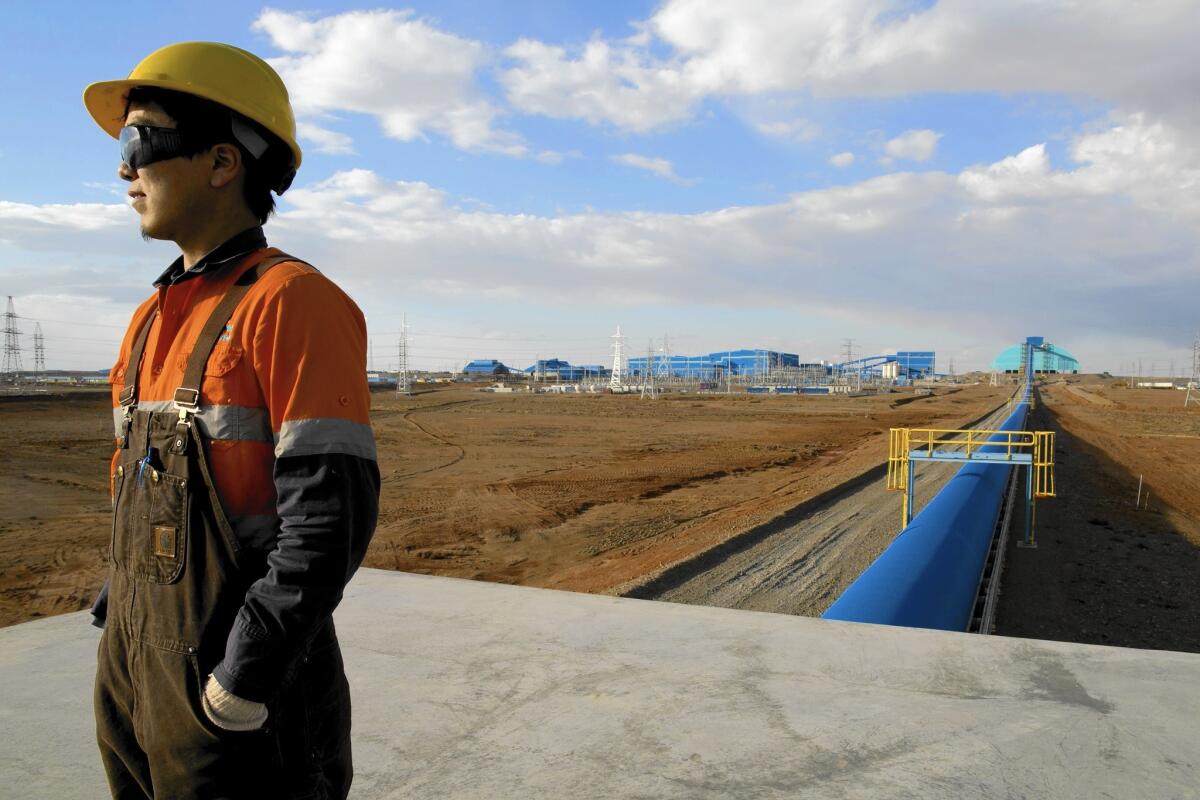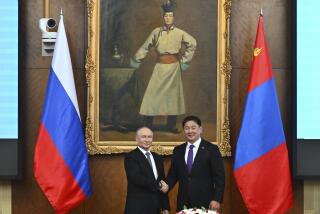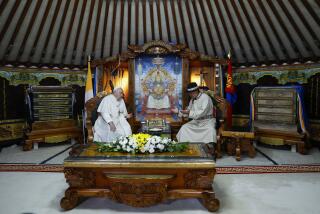In Mongolian gold mine lies a vein of hostility

- Share via
Reporting from Ulan Bator, Mongolia — Odgerel Tsagaan, a clerk at a cashmere shop here in Mongolia’s frigid, bustling capital, received a text message on her cellphone in late January from the recently installed prime minister, asking her advice on the country’s economic woes.
It wasn’t a prank: After notching the world’s fastest GDP growth in 2011 — 17.5% — the economy in this resource-rich but sparsely populated nation has slowed sharply, expanding 6.9% last year. With slumping global commodity prices, a weakened currency and plunging foreign investment — down 70% from 2013 to 2014 — the government has been at a loss to reverse the slide.
So Prime Minister Saikhanbileg Chimed took a page from TV talent shows and offered Odgerel and the nation’s 3.3 million other cellphone subscribers two options: Push ahead with more foreign investment in the mining sector, or pursue an austerity program, slashing public spending.
“The question was so general, I didn’t know how to respond,” said Odgerel, 28. “Both seemed like bad choices. I don’t think either will help ordinary people much, and prices just keep going up.”
Odgerel wasn’t the only one flummoxed; only about 10% of those polled answered the unscientific, nonbinding, four-day poll.
According to the government, 56% of respondents said they favored additional foreign investment. That was enough for the prime minister to claim a mandate and propose an amendment to the country’s minerals law to try to jump-start stalled projects.
Chief among them is part two of the giant Oyu Tolgoi gold and copper mine in the Gobi desert, which is being developed with the Anglo-Australian company Rio Tinto.
The amendment would let the state swap its ownership stakes in strategic deposits like the one at Oyu Tolgoi in return for royalty payments down the road from mine developers. Otherwise, as part owner, Mongolia would have to pony up a substantial portion of the $5-billion construction cost for phase two at Oyu Tolgoi. Mongolia and Rio Tinto have been at loggerheads over how to pay for the expansion.
The stakes are high: Oyu Tolgoi’s open-pit mining phase is already operating, but the underground second part is where an estimated 80% of the deposit’s total estimated value lies. The International Monetary Fund has calculated that Oyu Tolgoi could account for as much as one-third of Mongolia’s gross domestic product in 2021 if it reaches full production by then.
But as a small nation sandwiched between China and Russia — one that threw off communism for democracy in 1990 — Mongolia has many citizens who remain wary of ceding ownership stakes to foreign players.
Adding to the anxiety is nagging environmental concern about Oyu Tolgoi and other projects, and complaints that nomadic herders and others affected by the mines haven’t been adequately compensated.
Sukhgerel Durgenson of the environmental group Oyu Tolgoi Watch called the prime minister’s text-message tactic “totally unethical and undemocratic,” and charged that his moves to cut spending in December frightened the public into voting against austerity.
“I wanted to give a third opinion, but there was no option for that,” she said. “I want to know, how do you want to move forward with mining? How are you going to resolve the outstanding issues?”
On top of efforts to push Oyu Tolgoi’s expansion, Sukhgerel said she was concerned about the government’s recent announcement that it plans to resume granting mining exploration licenses for tens of thousands of square miles, after canceling 106 such permits in 2013 amid concern about corruption. “We don’t know what chaos that will create; there is no capacity to monitor it.”
Suggesting, a bit ominously, that the battle could escalate beyond the parliament, she said, “There are groups that believe instead of just showing arms, they should have used them.... Where do you draw the line between terrorism and the right to protect my land? This is not terrorism. This is my right to protect my home and my land.
“I’m not the type that likes to support the groups that like to use force, but if they decide to push ahead with [the amendment], I wouldn’t mind joining them. And I wouldn’t mind bringing the local communities to join them.”
Julian Dierkes, a sociologist at the University of British Columbia who follows Mongolian politics and mining closely, said there is not a particularly strong, coherent movement for “resource nationalism” in Mongolia, though some of the government’s sharp and sudden changes to mining regulations over the last decade have come in response to concern about state-owned Chinese companies entering the country.
Overall, he said, Mongolia simply lacks experience with mega-projects and suffers from an information gap vis-a-vis multinational mining companies, leading to policy swings. “Some of this is just trial and error” on the part of Mongolian policymakers, he said.
Even if Saikhanbileg’s amendment is approved by the parliament, it’s unclear whether Rio Tinto will jump to get Oyu Tolgoi moving forward again immediately, Dierkes said. “I don’t see indications that Rio wants to sign anytime soon. Copper prices are down at the moment; I don’t think they want to spend $5 billion right away.”
But with elections coming up in 2016, Saikhanbileg has only a year and a half to show results. So the clock is ticking on getting some big project underway, whether it’s at Oyu Tolgoi or the giant Tavan Tolgoi coal deposit or another mine. This month, with government finances looking precarious, Saikhanbileg sent out feelers to the International Monetary Fund about possible aid.
Jackson Cox, head of the American Chamber of Commerce in Mongolia, said the recent moves to resume granting exploration licenses, as well as the prime minister’s text-message mandate, are positive steps toward enticing foreign investment back to the country.
But those steps have been seriously undercut, Cox said, by a Mongolian court’s decision in late January to send three former mining executives — an American, Justin Kapla, and two Filipinos — to prison for five years on charges of tax evasion at their former employer, SouthGobi Resources. SouthGobi, whose largest shareholder is a Rio Tinto subsidiary, was fined $18 million.
The U.S. Embassy has expressed concern about language interpretation issues at the trial and other perceived irregularities. Kapla and his codefendants were barred from leaving Mongolia for years while prosecutors attempted multiple times to bring the case to trial. When the case was ultimately heard, Cox said, the prosecutor changed the sentencing recommendation at the last minute, switching from a fine to prison time.
“Bring it all together and it raises deep concerns on the part of international investors for investing here and putting foreign executives on the ground,” Cox said.
Other corporate leaders in the mining business said privately that they believed the sentences would be overturned on appeal.
In the meantime, though, Cox said, he’s advocating for the U.S. government to suspend talks on granting Mongolia a second round of development funding under a program called the Millennium Challenge Corp., which works with poor countries “that show they are committed to good governance, economic freedom and investing in their citizens.”
The program has funded projects in Mongolia to reduce noncommunicable diseases, build all-weather roads, cut air pollution and bolster vocational education.
“To have a second round of talks now is inappropriate,” Cox said. “There’s a dark cloud hanging over this country as long as this [tax case] is not resolved.”
More to Read
Sign up for Essential California
The most important California stories and recommendations in your inbox every morning.
You may occasionally receive promotional content from the Los Angeles Times.














